Coronavirus has brought the welfare state back and it might be here to stay
Public policy experts on how widespread job loses could change the UK’s thinking on welfare
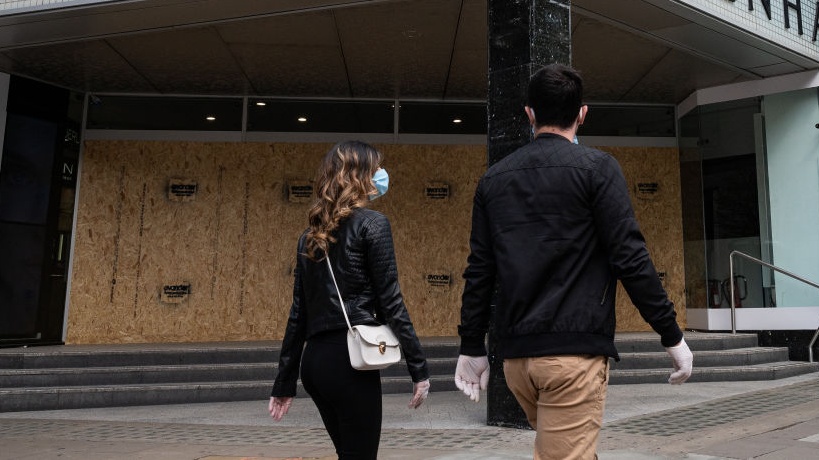
A free daily email with the biggest news stories of the day – and the best features from TheWeek.com
You are now subscribed
Your newsletter sign-up was successful
Jeevun Sandher, department of political economy at King’s College London (KCL) and Hanna Kleider, lecturer in public policy at KCL, on the rise and rise of welfare policy.
Governments across the developed world have responded to the Covid-19 crisis by making welfare states vastly more generous. Historical parallels suggest that this munificence may endure even as the pandemic recedes.
Welfare states will only, however, become permanently more generous if voters believe this pandemic poses an enduring risk to their incomes and if they make common cause with the people who have been worst affected.
The Week
Escape your echo chamber. Get the facts behind the news, plus analysis from multiple perspectives.

Sign up for The Week's Free Newsletters
From our morning news briefing to a weekly Good News Newsletter, get the best of The Week delivered directly to your inbox.
From our morning news briefing to a weekly Good News Newsletter, get the best of The Week delivered directly to your inbox.
The most pertinent historical parallel to the current situation is the Second World War. After the conflict, governments dramatically increased both the number of people covered by the welfare state and the value of the payments they received. At that time, people were demanding greater social insurance in the face of universal risks and pervasive uncertainty.
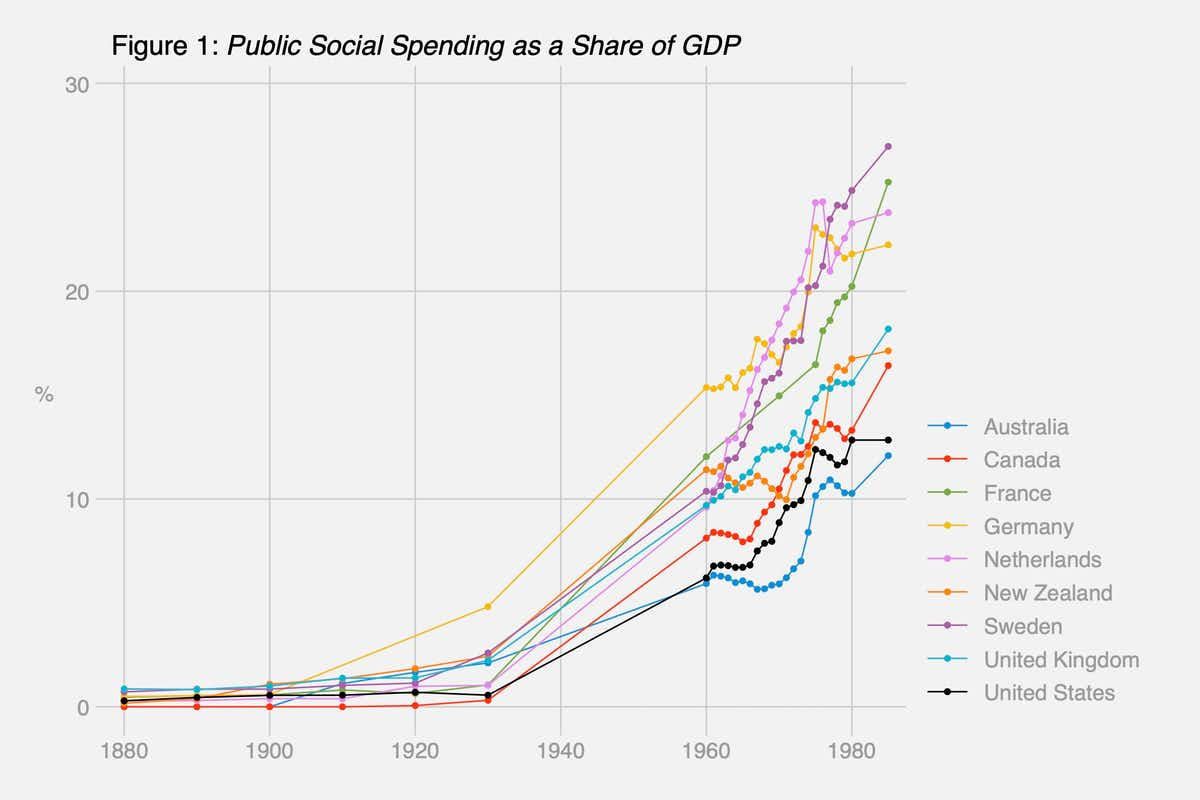
Social Spending includes the following: health, old age, incapacity-related benefits, family, active labour market programmes, unemployment, and housing.Our World in Data (2020), CC BY
The late 1970s marked the end of this golden era. Technological advances, demographic change and globalisation led to increased fiscal pressures and cuts to the generosity of modern welfare states.
Alongside these structural pressures, automation and trade were also destroying mid-skill manufacturing occupations. Labour markets became segregated into high- and low-skilled jobs. And while high-skilled workers didn’t feel the need for an expanded welfare state, those working in low-skilled professions were too small a constituency to make a difference at the ballot box.
A free daily email with the biggest news stories of the day – and the best features from TheWeek.com
In short, structural pressures were making the welfare state more expensive and governments faced little electoral incentive to be generous.

Dotted line indicates the start of the Great Recession in 2007.Comparative Welfare Entitlements Dataset
Later, the impact of the recession that followed the 2007-8 financial crash was concentrated among low-skilled workers. Governments did not increase the generosity of the welfare state in response. The total amount spent on social security payments did temporarily increase as unemployment rose, but the individual payment amounts did not.
What makes Covid different?
The impact of the current economic crisis is much wider. Both the pandemic and the corresponding public health measures – the forced closures of businesses and schools - have taken their toll on people’s ability to work across the income distribution. The figure below shows that the increases in unemployment claims literally go off the old charts.
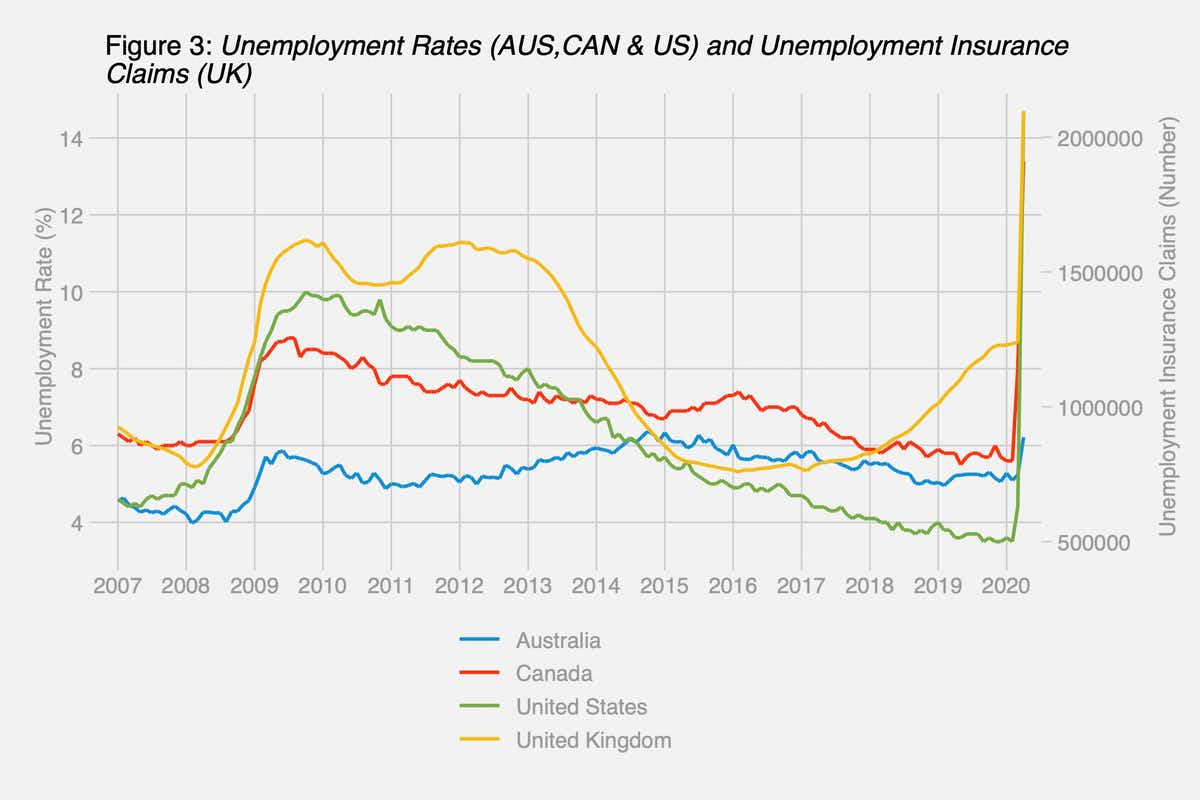
Australian Bureau of Statistics, Statistics Canada, Bureau of Labor Statistics (US), Office for National Statistics (UK)
Just as with the Second World War, the universal impact of this crisis and the subsequently greater risks it poses has led to a correspondingly large increase in the generosity of the welfare state.
The particular hazards this pandemic poses has also led to changes to specific social insurance payments. The risks to people’s health have increased demand for sick pay among workers.
Everyone who could potentially be infected is advised to stay away from work for between one and two weeks, and governments have been stepping up and cover that cost. Even the US, which had no nationally mandated sick leave prior to this crisis, finally introduced some sick pay in response to the pandemic.
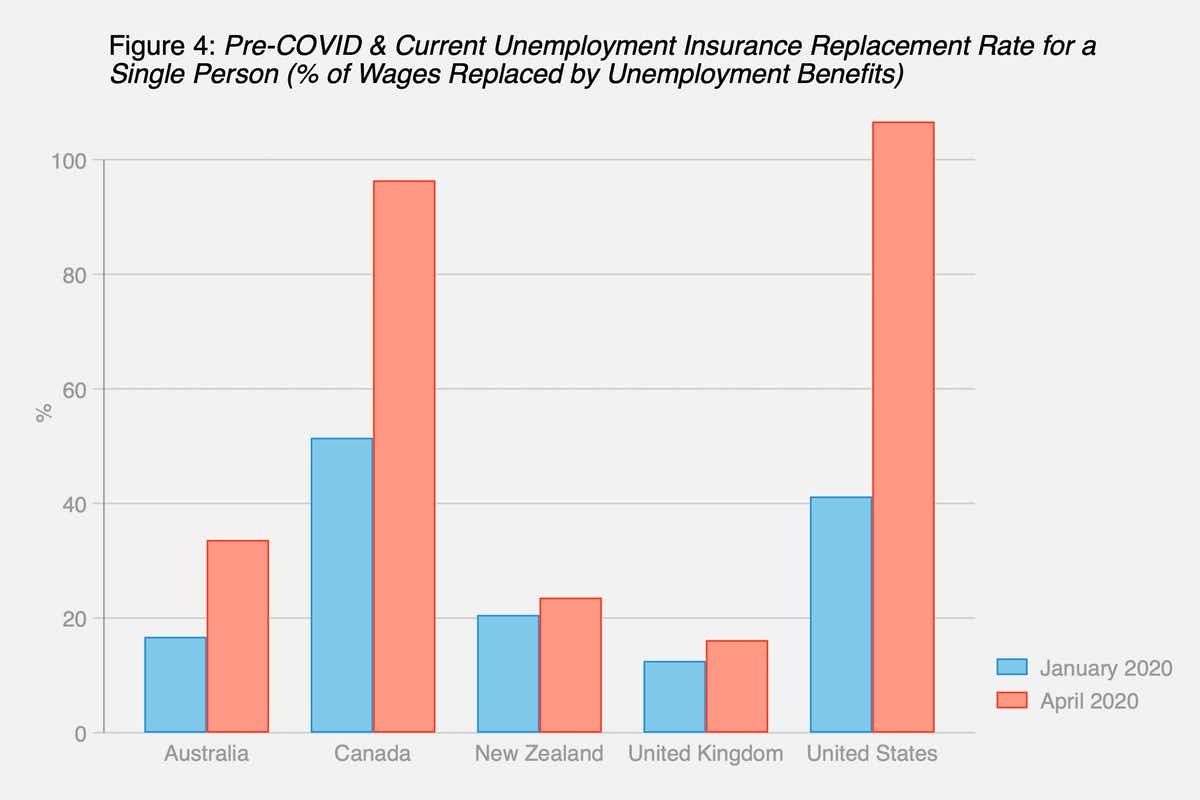
Canada figure includes both Employment Insurance and Canada Emergency Response Benefit. US figure takes average UI payment across states plus national Pandemic Unemployment Compensation Payment of $600. Average Wage in 2019 used for calculations across all countries. Australian Government, Government of Canada, Center for Budget and Policy Priorities (US) & Department for Work and Pensions (UK).
A new consensus on welfare
This pandemic will only, however, lead to a permanently more generous welfare state if electorates believe it poses an enduring risk to the livelihoods of themselves or those they care about and subsequently vote for governments who will protect their incomes.
If enough voters now feel that this pandemic or a future crisis could suddenly and dramatically hit their incomes, then they will demand significantly higher social insurance payments as protection. Political parties will then feel pressure to deliver on these demands in order to win elections.
But here we sound a note of caution. This pandemic will not necessarily lead to a more generous welfare state. While its impact has been universal, the economic and health risks have been, and will continue to be, most severe for the poor.
It has been low-paid workers in sectors such as tourism, hospitality, retail and transport who have been the most likely to lose their jobs. High-skilled workers may still demand higher social insurance payments either because they are concerned for their own incomes or feel an affinity with the worst affected, but this is not guaranteed.
If it is only the low-skilled few who demand a more generous welfare state, then governments will feel little pressure to deliver it.
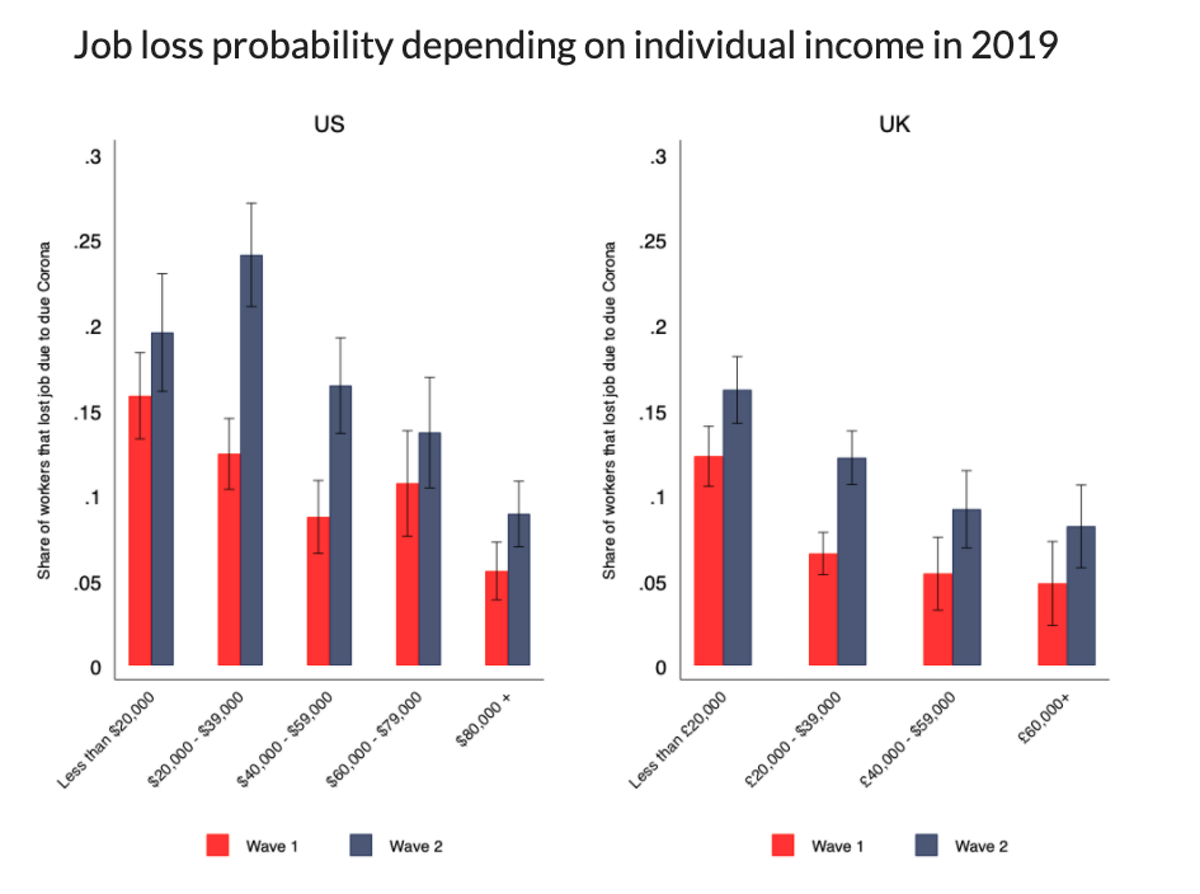
Unemployment Risk by Earnings in the UK and USA.Covid Inequality Project
Covid-19, by posing a universal risk and forcing us to engage in a common cause, has the potential to forge a new consensus on the welfare state. A majority of voters could now demand that political parties supply social insurance payments that are significantly more generous than before the crisis hit.
When this pandemic passes, electorates may not be content to reduce sickness-related social security payments knowing that they could have needed it, or may do, in the future. They may not be satisfied that social security payments to a now-essential grocery store worker are too low to allow them to escape poverty.
Just as with the Second World War, “one happy consequence of this otherwise desperately unhappy experience,” may be a more generous welfare state that insures us all against the risks posed by illness and poverty.
Jeevun Sandher, Department of Political Economy at KCL, and Hanna Kleider, lecturer in public policy at KCL.
This article is republished from The Conversation under a Creative Commons license. Read the original article.
-
 Quiz of The Week: 14 – 20 February
Quiz of The Week: 14 – 20 FebruaryQuiz Have you been paying attention to The Week’s news?
-
 The Week Unwrapped: Do the Freemasons have too much sway in the police force?
The Week Unwrapped: Do the Freemasons have too much sway in the police force?Podcast Plus, what does the growing popularity of prediction markets mean for the future? And why are UK film and TV workers struggling?
-
 Properties of the week: pretty thatched cottages
Properties of the week: pretty thatched cottagesThe Week Recommends Featuring homes in West Sussex, Dorset and Suffolk
-
 How corrupt is the UK?
How corrupt is the UK?The Explainer Decline in standards ‘risks becoming a defining feature of our political culture’ as Britain falls to lowest ever score on global index
-
 How long can Keir Starmer last as Labour leader?
How long can Keir Starmer last as Labour leader?Today's Big Question Pathway to a coup ‘still unclear’ even as potential challengers begin manoeuvring into position
-
 ‘Being a “hot” country does not make you a good country’
‘Being a “hot” country does not make you a good country’Instant Opinion Opinion, comment and editorials of the day
-
 The high street: Britain’s next political battleground?
The high street: Britain’s next political battleground?In the Spotlight Mass closure of shops and influx of organised crime are fuelling voter anger, and offer an opening for Reform UK
-
 The MAGA civil war takes center stage at the Turning Point USA conference
The MAGA civil war takes center stage at the Turning Point USA conferenceIN THE SPOTLIGHT ‘Americafest 2025’ was a who’s who of right-wing heavyweights eager to settle scores and lay claim to the future of MAGA
-
 Is a Reform-Tory pact becoming more likely?
Is a Reform-Tory pact becoming more likely?Today’s Big Question Nigel Farage’s party is ahead in the polls but still falls well short of a Commons majority, while Conservatives are still losing MPs to Reform
-
 The launch of Your Party: how it could work
The launch of Your Party: how it could workThe Explainer Despite landmark decisions made over the party’s makeup at their first conference, core frustrations are ‘likely to only intensify in the near-future’
-
 What does the fall in net migration mean for the UK?
What does the fall in net migration mean for the UK?Today’s Big Question With Labour and the Tories trying to ‘claim credit’ for lower figures, the ‘underlying picture is far less clear-cut’